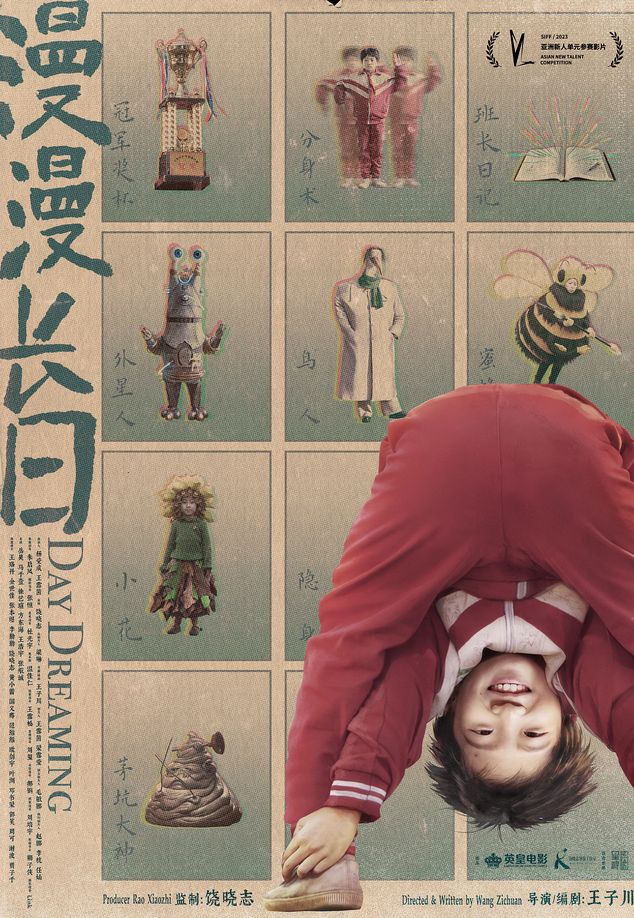After a long hiatus, China’s largest film festival is back and, with it, some of the best Chinese films of the year so far
For cinephiles in China, Shanghai is arguably the place to be in summer. For more than a week every June, Shanghai International Film Festival (SIFF), China’s largest film festival by number of films screened, brings the city a taste of both international cinema rarely shown in domestic theaters, and high-profile Chinese films before their world premiere.
From June 9 and 18 this year, the festival returned with its highly anticipated 25th edition after being cancelled in 2022 due to the pandemic. Some 450 titles from around the world screened in over 40 cinemas across the city—an incredibly diverse offering ranging from the superhero blockbuster The Suicide Squad (2021) to the seven-hour political saga A Tale of Filipino Violence (2022), the 4K restoration of A City of Sadness (1989), newer titles like Everything Everywhere All at Once (2022), and a fresh slate of domestic films.
Here are five new Chinese films from SIFF 2023 that are worth a watch:
100 Yards
This historical action drama derives its title from Tianjin martial arts schools’ tradition of handling affairs within 100 yards of their gate. Set in 1920s, the story focuses on the rivalry between Shen An (Jacky Heung), the son of a martial arts master, and Qi Quan (Andy On), the master’s top disciple. When their school is left to Qi’s leadership, Shen challenges him with the help of a several others who seem to have their own agendas.
Writer-director Xu Haofeng has been renewing the wuxia genre with his more understated, philosophical films such as The Sword Identity (2011) which screened at Toronto and Venice Film Festivals. Although his last two films are yet to receive the “Dragon Label” permit for screening films in China, Xu secured a spot in the SIFF Gala section for out-of-competition world premieres for 100 Yards, an adaptation of his own novella co-directed with his brother Xu Junfeng.
Viewers familiar with Xu’s films will appreciate his elaborate plotting that complicates the simple story, while others may find it repetitive. The action choreography of the film is a marked improvement from Xu’s previous projects, especially in two extended fight scenes in a bathhouse and a back alley covered with red dust that rely on nifty, well-coordinated stunts rather than over-the-top wire work. The cameo appearances of Ren Ke and Mao Tao, members of the popular folk rock band Wu Tiao Ren, almost become laughingstocks as their amusing off-screen personas overshadow their onscreen roles, but casting them is an on-brand move for Xu’s signature cartoonish humor in the most serious moments.
Day Dreaming
In this fantasy comedy, the small-town life of third grader Zhu Tong takes a magical turn.
It all starts with a botched attempt at forging his grandpa’s signature on an exam paper. However, the simple act of mischief somehow leads to encounters with a pickpocket crane, an electricity-inducing alien fighter, and a Jabba-the-Hut-like creature named Craphole Creeper.
This impressive debut by actor-turned-writer-director Wang Zichuan is arguably the most pleasant surprise among the festival’s domestic titles. During the Q&A after its premiere as part of the festival’s Asian New Talent competition, Wang aptly described his film as “too naïve for kids and just right for adults.” By not directly addressing certain social issues, such as the plight of left-behind children and the limits on individuality in the Chinese education system, which nevertheless hang ostensibly in the background of the story, Day Dreaming steers clear of melodrama and cliché, making its bittersweet ending all the more powerful.
The humor of the story is extended by Zhu’s voiceover narration and some scenes are undeniable knee-slappers. One scene, where Zhu comes up with a pseudonym to avoid punishment for playing hooky, will have Chinese but especially Shanghai audiences roaring with laughter, as it did during the film’s premiere at SIFF. For his portrayal of the adorable mischief maker, 10-year-old Yue Hao won the best actor award in the Asian New Talent section.
May
This wholehearted and at times hilarious Shanghainese-dialect documentary, another entry in the Asian New Talent competition, follows 72-year-old Yu Mei, or May, on her quest for a companion in her native city of Shanghai.
Every day, May makes the trip from her tiny suburban rental room to the downtown dance halls and smoke-filled mahjong clubs. But she’s not exactly looking for love, that is, unless love means free meals and downtown flats. “Society is all competition,” she says. But director Luo Dong’s intention is not to show May in a bad light. Far more interesting is his focus on the daily lives of May and many other elderly citizens who find dates in Ikea food courts and carefully keep track of who’s whose “paramour.”
After his debut feature New York New York (2016), a disappointing romance drama about two lovers in Shanghai who dream of starting a new life in the US, Luo Dong seems to have found success with nonfiction filmmaking: the 47-year-old Shanghai-born filmmaker went on to win the best director honor of the section.
Habitat
Another Shanghainese-dialect documentary on the life of senior citizens that won the hearts of festival-goers was Habitat by University of Hong Kong graduate student Szesze Ip. The film starts in 2014 as Ip follows her great uncle Sheng Zhengming and his friend Wang Lele, both in their late 70s, as they attempt to overcome a common struggle: obtaining a visa.
Wang, a retired piano teacher, wants to visit her son who emigrated to Canada some 20 years ago, but her visa application has already been rejected twice. Meanwhile, Sheng’s wish is to travel to Japan to meet Mr. Konno, a friend who he hasn’t seen since the latter’s departure from Shanghai over 20 years ago.
Ip’s voiceover narration leans towards the melodramatic and could have been omitted, especially when what’s captured on her camera is already moving and poignant. Against all odds, Wang and Sheng persist in their cheerful, almost childlike optimism. The opening credits of the film state that there are over 300 million people over the age of 60 in China and that most of them are empty-nesters. Ip offers a glimpse into what their life is like, in all its loveliness and loneliness.
All Ears
Writer-director Liu Jiayin’s first feature in 14 years was one of the 12 titles vying for the Golden Goblet Awards in the narrative film competition, the festival’s highest prizes. While general audiences may not be familiar with Liu’s work, her extremely quotidian yet innovative docufictions Oxhide (2005) and Oxhide II (2009) are critically acclaimed around the world and have won awards at Berlin, Vancouver, Hong Kong, and other festivals.
For her first fully fiction feature, the Beijing Film Academy professor tells the story of Wen Shan (Hu Ge), a failed scriptwriter who has become the best eulogy writer in Beijing. Commuting around the city on a share-bike, Wen goes from client to client—people who are mourning their sibling, parent, CEO, or even a friend they have met on the internet. Learning about the lives of the deceased from those who survived them helps Wen (and perhaps the audience) see the hidden sides of other people’s lives and apply the lessons in his own life. All Ears is Liu’s evocative and soothing meditation on memory and truth (or versions of it), as well as the legacy of the dead, the living, and the fictional.
Backed by several production companies, the film doesn’t lack star power, featuring high-profile performers such as Wu Lei, Qi Xi, and Bai Ke. Hu and Liu won the Best Actor and Best Director awards respectively in the main competition. The film is set to have a theatrical release in China on September 9.


















